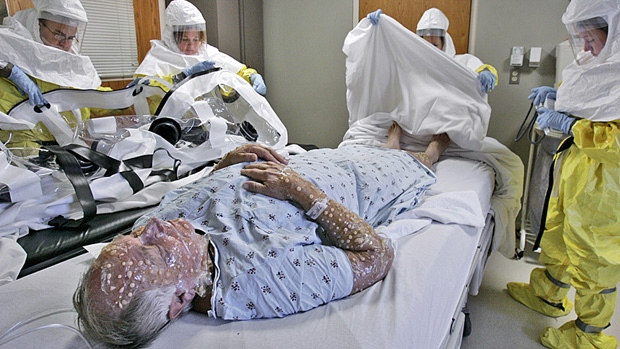Successfully synthesizing smallpox virus, the risk of a deadly epidemic returning or the development of chemical weapons?
Smallpox is a contagious disease of the human race that once caused one of the four most terrible pandemics in history. Before being declared wiped out by the World Health Organization (WHO) in 1979, it was able to kill 500 million people.
- Finding a way to kill the HIV virus
- Scientists are predicting the next pandemic, it may have already begun but we don't know
A group of scientists from the University of Alberta, Canada have synthesized a strain of artificial smallpox virus, a study published in Science makes many people fear about the revival of this deadly disease. and the development of biological weapons in the future.

First of all, the horsepox virus strain created by the University of Alberta is called Horsepox, which is quite benign. Even if they escape outside the laboratory, they cannot threaten human health.
But the story behind it is a controversial and worrying issue.
Rearranging the gene sequence to synthesize artificial viruses is a new research direction. In 2002, British scientists successfully synthesized artificial viruses for the first time, a form of polio. They tested it on mice and they were all killed by viruses. This has sparked debates about whether someone can synthesize a killer virus, then turn it into a biological weapon.
At that time, some researchers believe that virus synthesis is very difficult and expensive, only a few people and labs can do so we don't have to worry about it.
But the success of the group of scientists at the University of Alberta made those thoughts change. At a low cost, only about $ 100,000, they were able to synthesize artificial horsepox viruses.
This shows that reducing costs, simplifying processes and finding ways to create multiple synthetic viruses is only a matter of time. We need to pay more attention to the problem of virus synthesis.

David Evans, professor of microbiology and immunology, a scientist who led the research team at the University of Alberta, is now a member of the Advisory Committee of the World Health Organization (WHO), said. he has repeatedly mentioned to the WHO that smallpox virus will soon be synthesized very easily before and his research is not for bad purposes but only for the benefit of medicine.
Specifically, Evans's big goal is to rely on a relative virus with smallpox to develop a cancer vaccine. And studying this horsepox synthesis is a stepping stone to getting closer to that goal.
Evans added that he also synthesized horsepox viruses that were also ordered from Tonix, a US pharmaceutical company, that is planning to develop a better anti-smallpox vaccine.
But this makes many people wonder why Tonix wants to develop a vaccine when smallpox has been wiped out for nearly four decades and we don't need vaccination to prevent smallpox anymore. The fact that they ordered a study in Canada and not the United States, where a study of virus synthesis could not be approved also made many people suspicious.
Dr. Fauci, director of the American Institute of Allergy and Infectious Diseases, said the virus synthesis research is classified as DURC (dual use research of concern), dangerous works of harmless research. Most likely, the purpose of creating synthetic viruses could be to disguise biological weapons that carry dangerous pathogens.

In 2011, with the support of the US government, a Dutch scientist transformed the H5N1 avian influenza virus and created a strain of virus that spreads out of the range of infection in poultry to spread the disease through ferrets. . This new strain is likely to infect humans and the risk is particularly dangerous.
Professor of Epidemiology at Harvard University Marc Lipsitch said that Professor Evans' research itself does not matter but his publication of it, including how to synthesize smallpox viruses on a single issue Scientific lice, can make many people use knowledge from this research for bad purposes.
Until now, we can still be assured that the horsepox virus Professor Evans created, at least they have not flown from the lab, nor created a great risk.
However, Evans' success word shows the fact that with only a private source of funding, not under government control, viruses can be synthesized very easily and very cheaply. No one can foresee that the virus created is not as harmless as the horsepox?
You should read it
- ★ Journey of humans overcome dangerous diseases in history
- ★ 7 computer viruses you should be careful
- ★ What is pandemic? When does WHO announce an epidemic as a pandemic?
- ★ No need to use an antivirus program, this is how to get rid of the virus on your computer
- ★ Scientists are predicting the next pandemic, it may have already begun but we don't know